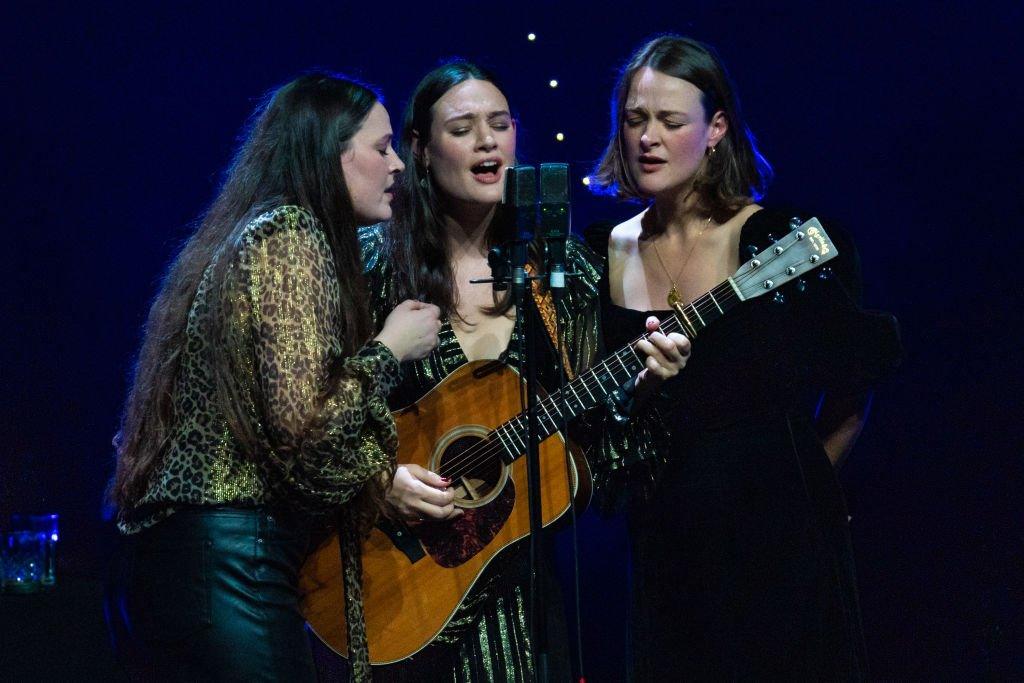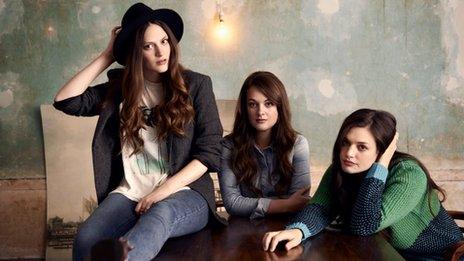The Staves: 'The pressure to feel empowered is suffocating'
- Published

Camilla and Jessica Staveley-Taylor: 'We both had ghosts to exorcise on this record'
In an era of cost-cutting, even successful indie-folk bands are prone to shrinkflation.
So if you buy The Staves' fourth album, All Now, you may notice the group has slimmed down from a trio to a duo: that's one less angelic voice for your money.
The change comes after Emily Staveley-Taylor took a break to raise two young children, leaving the family business in the hands of her younger siblings, Jessica and Camilla.
Which raises the question, what kind of monsters would sack their own sister while she's on maternity leave?
"These kinds of monsters!" declares Jessica. "Shall we go straight into the tabloid story? 'The Staves tell all about their acrimonious split!'"
Of course, she's joking. In fact, the new album even features a touching tribute to Emily - a rollicking, Beatleophile song called After School.
"It's literally about starting school and looking up to my big sister," says Jessica.
"She had my back and was the coolest person in the whole world. Everything she wore, her makeup, the music she listened to was cool. We followed her 100 per cent."
It wasn't just at school. In the evenings, the sisters all acted in a local theatre company, and Emily got all the lead roles.
"She was Peter Pan, she was Annie," recalls Jessica. "Someone gave her a bouquet of flowers and in your perception, when you're that young, it was like she was famous.
"So this is really a love song to her."

Emily (right) made her swansong with two sold-out nights at The Barbican, as the band celebrated the 10th anniversary of their debut album
Still, Emily's departure raised big questions for a group founded upon intricate, three-part harmonies.
Rather than becoming the indie Sugababes and "allowing some other girl to take Emily's place", they reconfigured their songs for two voices, and asked their touring band to fill in the gaps.
Having successfully tested the approach on tour, The Staves felt confident it could work in the studio, too.
"It's been a learning curve for us, to realise that The Staves can be a kind of fluid entity that changes when it needs to, and our fans are still our fans."
Reinvigorated, they began recording with the same commitment to musical growth that's characterised their career to date.
Their debut, 2012's Dead & Born & Grown, was acoustic and intimate, a time capsule of their teenage years playing pubs around Watford.
The follow-up, If I Was, was recorded in Wisconsin with Bon Iver, adding orchestral flourishes and dense drums to Jessica's finger-plucked guitars.
2021's Good Woman was lyrically sharp-toothed, biting down on topics like femininity and self-doubt, while processing the sudden death of their mother.
Writer's block
The new record emerged from an equally turbulent period - not just the reconfiguration of the band but, for Camilla, a reckoning with her mental and physical health, as she dealt with chronic pain and a series of operations due to endometriosis.
On top of that, she says, "I had some pretty major writer's block, which is so demoralising. You're feeling all these emotions and you just can't get them out."
Lost and unable to express herself, she noticed she was being bombarded with positive affirmations on social media. Be strong, stand up, seize your moment - well-meaning platitudes that reinforced her feelings of helplessness.
"The pressure to feel empowered is suffocating," she says. "I don't feel particularly empowered, actually. Sometimes, things are crap.
"But it's not enough to be a normal person with feelings, especially for women. You're supposed to be out there, in people's faces, being an activist.
"You can end up feeling that, no matter what you do, you don't fit."
Camilla's frustration grew so intense it ruptured the barrier to her creativity, inspiring the new album's title track, All Now.
Over an insistent, repetitive synth, the lyrics scroll out like a social media feed of empowerment memes. Camilla, however, sounds unconvinced.
"We can stick it to the man/ And come out fighting... But would it be alright/ If I sit this one out tonight?"
It's OK to be sad or feel depleted, she insists, and you shouldn't be made to feel bad about it.

The music video for All Now satirises 1970s TV shows, where audiences paid rapt attention to the "wisdom" dispensed by their pop idols
"The funny thing about that song is it's actually quite upbeat and galvanising," says Jessica. "It's almost a celebration of the feeling of not fitting in."
Those themes of uncertainty and alienation define the album.
I Don't Say It, But I Feel It acknowledges the way we dodge truthful answers to questions like, "are you happy?". The nagging percussion of Make A Decision evokes the crippling burden of anxiety. I'll Never Leave You Alone is a gorgeous ballad about fighting your inner critic.
The song began with Jessica "having fun with rhyming words", inspired by reading bedtime stories to her niece.
But as she continued, it became apparent the lyrics were really about the "different facets of being a woman".
"You can be confident and be shy, and be brave and be a coward at the same time," she says. The trick is not to emphasise one over the other.
"If there's fear and worry, there also has to be hope to balance it out. It's OK and it doesn't have to rule you."

The group say Emily may rejoin in the future: "Nothing is set in stone. It's just that, for this record, this is where we're at".
To make the album, the band called up John Congleton, the Grammy Award-winning producer for Lana Del Rey, St Vincent, and David Byrne.
They'd forged a good working relationship on Good Woman (Jessica calls him their "Gandalf") but he had one condition: Don't finish the songs before you come to the studio.
The idea was capture the band's spontaneity and humour, rather than fruitlessly trying to recreate the magic of a demo.
The only problem was that Congleton was booked solid for a year. Then fate intervened.
"He got in touch one day and said: 'Someone's cancelled a session, but it's in a month - can you do it?'," Jessica recalls, as they weren't ready for recording.
"It lit a fire under us. We work quite well with a deadline."
With four weeks to go and only half an album of material, they abandoned their cosy Hackney studio for the Peak District.
"We sat in this cottage surrounded by sheep and thought, 'Let's be totally uncensored and not worry if we're writing complete rubbish'," says Camilla.
They woke up with the sun every morning ("harrowing") and, after breakfast, locked themselves in separate rooms with a guitar and wrote until dinnertime, "trying to make songs that stood up by themselves without any bells and whistles".
That "last gasp" of creativity gave the album some of its most powerful songs - including the pulverising Great Wave, a story of personal reckoning whose slashes of serrated guitar count as the heaviest thing The Staves have ever recorded.
Meanwhile, the sisters gained a newfound appreciation for the tranquillity of sheep.
"Can I just say they were having a great time?" says Jessica. "They were always having a lovely day and didn't seem stressed."

The duo have just been on the road in the US, and will start a UK and European tour in May
Back in the studio, freed from the distractions of livestock, they built the songs up with a live band and, on occasion, a special guest vocalist.
"There were a couple of songs about us [as a family] and particularly about our mum and it felt spiritually important to have Emily on them," says Jessica.
"So she's still involved, but she did not bloody help out writing this time."
'Difficult to earn a living'
With a new line-up comes a new record label. All Now will be The Staves' first release on Communion, after they parted ways with the bigger, multinational Atlantic Records in 2022.
In previous interviews, they've suggested Atlantic signed them on a wave of optimism about British folk-rock, following the success of Mumford and Sons, only to discover the market was smaller than they'd thought.
But while The Staves haven't scored to 10 singles or headlined festivals, they do have a healthy following, with sold-out tours and one million monthly listeners on Spotify.
Nonetheless, the economics of being a small, independent act are tough.
"In all honesty, it's difficult to earn a living," says Jessica. "There are peaks and troughs, which makes it very hard to plan ahead [financially]."
"I'm the least well-off of all my school friends," adds Camilla.
"The amount you get per stream is piteous, so it's more likely you're going to be in a flat-share with five other people in East London."
When Emily left, then, it might have been easier to call it quits. Instead, the upheaval helped Jessica and Camilla recommit.
"In making this album, I've realised the value of re-evaluating your life regularly," Camilla confirms.
"Sometimes you need to shake off the excess baggage and enjoy the moment," confirms Jessica.
"And I think that's what happened in the making of this record."
Related topics
- Published20 October 2020

- Published21 March 2015

- Published1 July 2013
